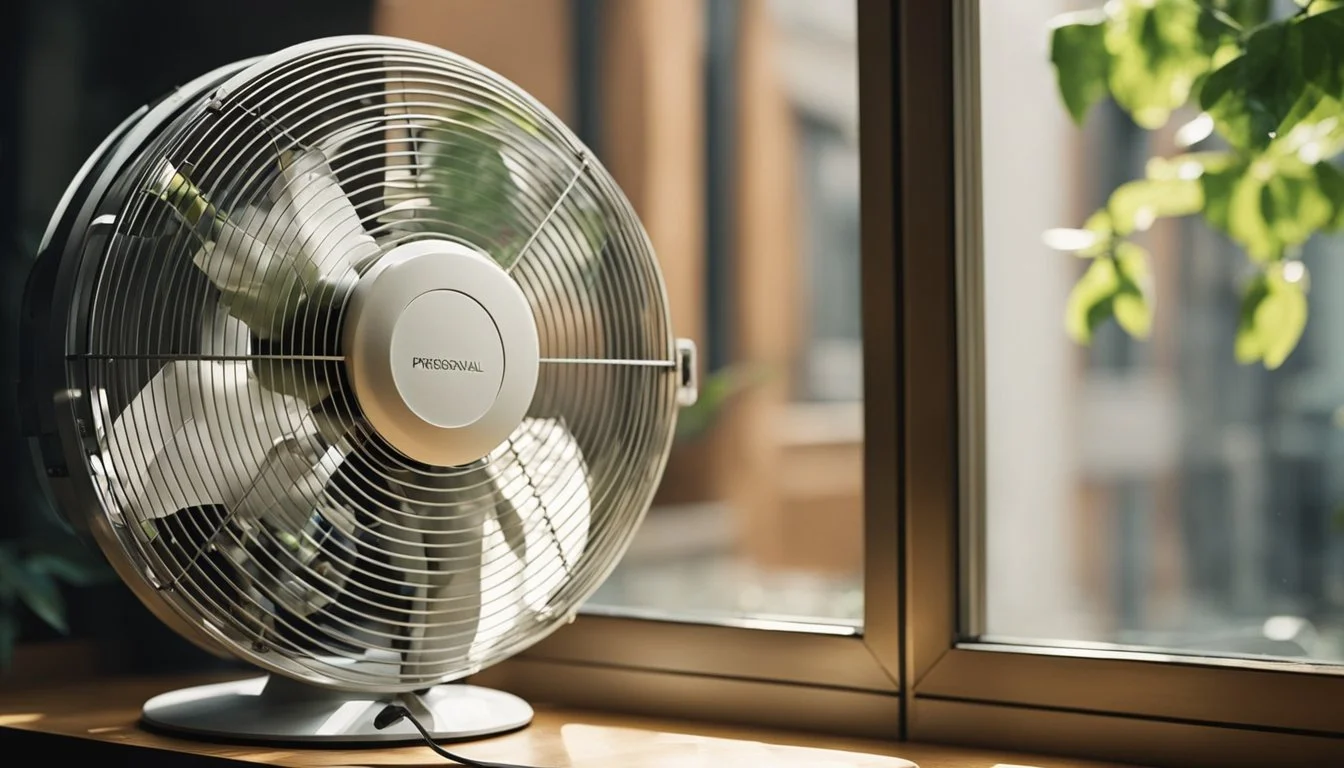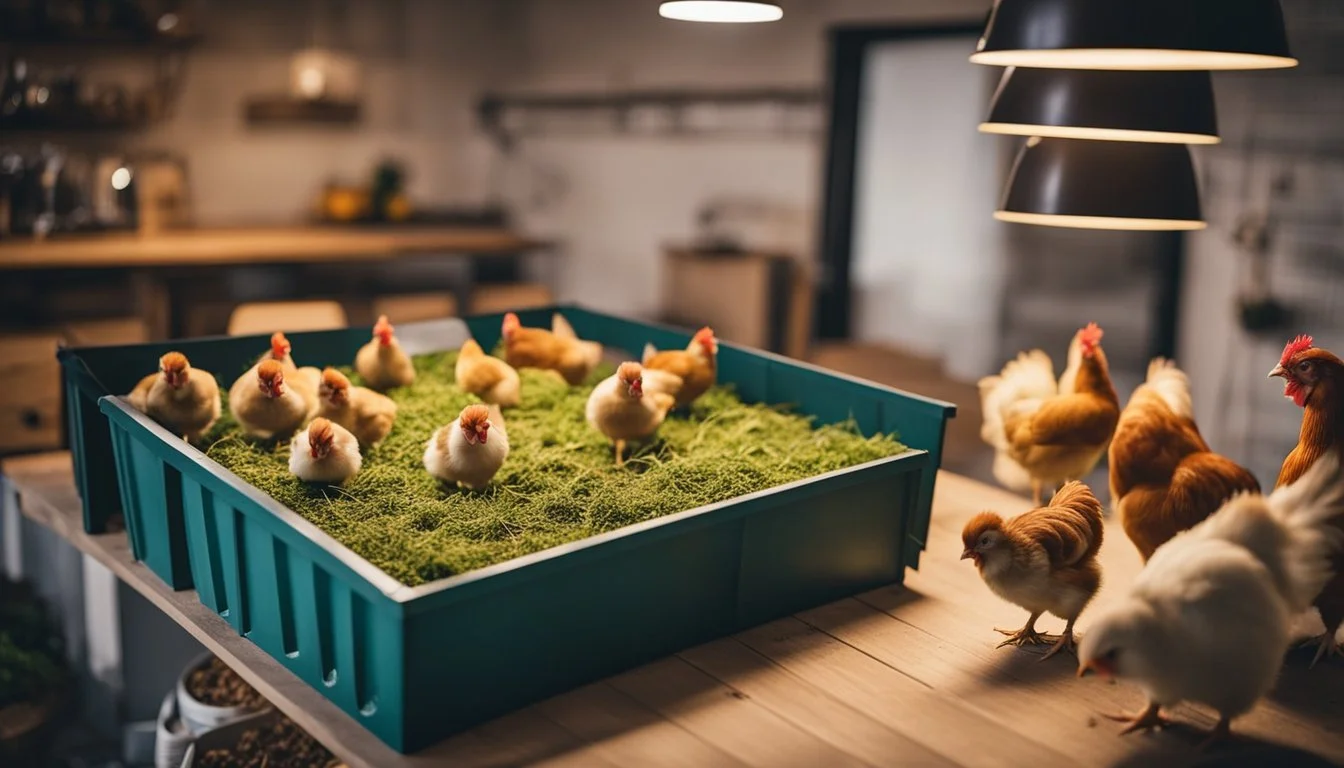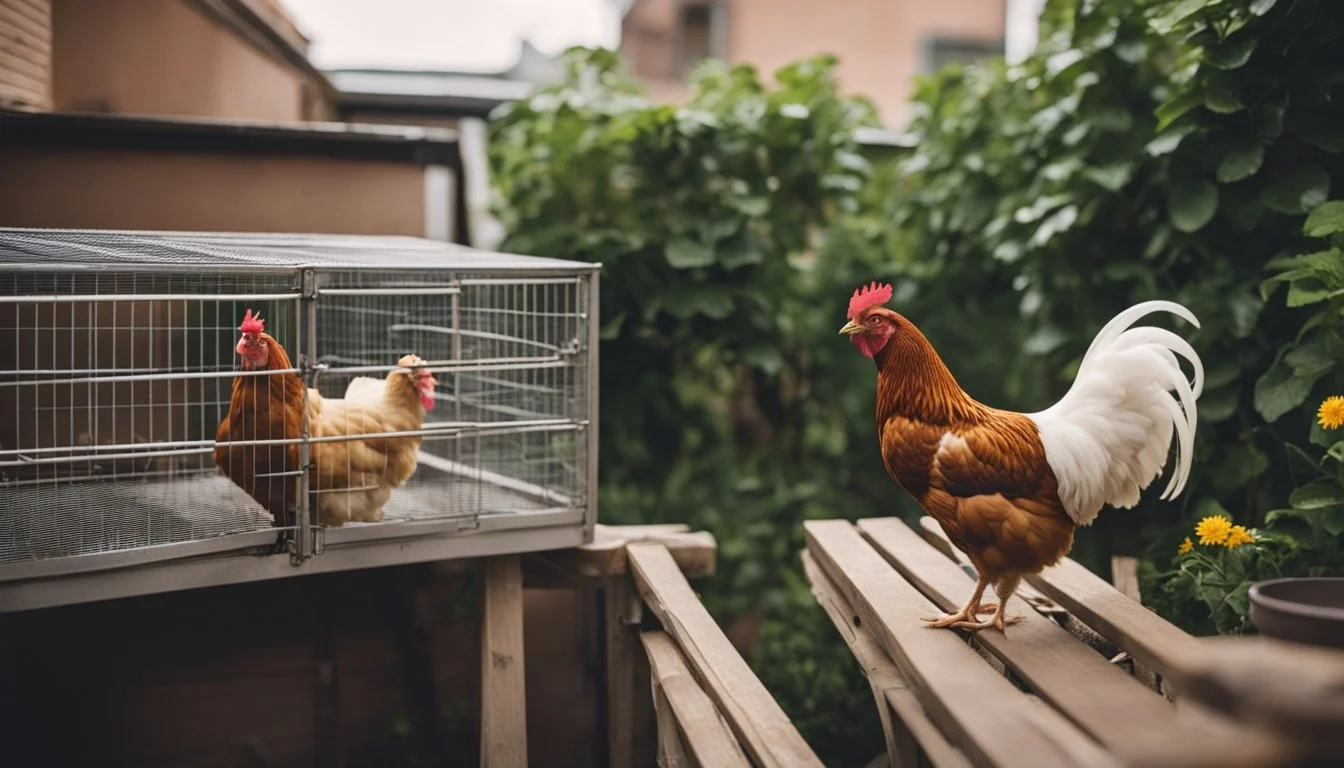10 Tips for Raising Chickens in an Urban Apartment
Expert Guidance for City Living
Raising chickens in an urban apartment might seem unconventional, yet it's a growing trend among city dwellers seeking a self-sustaining and eco-friendly lifestyle. With limited space and special considerations for neighbors, urban chicken raising requires innovative solutions and dedicated care.
How can one successfully keep chickens in an urban apartment environment? This article will provide essential tips and practical advice to help urban residents navigate the challenges of apartment chicken keeping, ensuring their poultry are healthy, happy, and productive.
1) Choose Bantam Breeds
Bantam chickens are ideal for urban apartments due to their small size. They are about half to two-thirds the size of regular chickens, which makes them easier to manage in limited spaces. This compact stature is perfect for fitting into small coops or cages often necessary in an urban setting.
These miniature chickens consume less feed than standard breeds. This can reduce overall costs and storage requirements for chicken feed. A smaller feed bill is particularly beneficial for apartment dwellers with limited budgets and space for storing large quantities of feed.
Bantam breeds tend to have gentle dispositions, making them manageable pets. They are generally easier for children to handle, which could be a plus for families. A calm and friendly temperament also helps when space is tight, as less stress means a healthier bird.
Choosing bantams does not mean sacrificing variety. There are many bantam breeds, each with unique characteristics. Popular breeds such as Silkies, Sebrights, and Bantam Cochins offer diversity in appearance and egg production. This variety allows urban chicken keepers to select birds that best meet their preferences and needs.
2) Provide Adequate Ventilation
Adequate ventilation in a chicken coop helps maintain a healthy environment. Proper airflow controls temperature and humidity, reducing the risk of respiratory issues.
Urban chicken keepers should ensure their coops have well-placed vents or windows. It’s essential to protect these openings with mesh or netting to keep out pests and predators.
Good ventilation also minimizes odor buildup by allowing fresh air to circulate. Be mindful of weather changes and adjust ventilation as needed to prevent drafts during colder months.
3) Invest in Quality Feed
Quality feed is crucial for the health and productivity of urban chickens. A balanced diet ensures that hens receive all the necessary nutrients. This typically includes grains, proteins, and essential vitamins. High-quality chicken feed should be the primary source of their nutrition.
Cheap feed can lead to nutrient deficiencies. This impacts egg production and the general well-being of the flock. Investing in a reputable brand specializing in poultry feed guarantees better results.
Chickens also benefit from occasional treats. Fruits, vegetables, and kitchen scraps can be given, but they should not replace their main diet. Always ensure any additional food is safe and suitable for them.
Consider supplementing with calcium sources like crushed eggshells or oyster shells. This is vital for strong eggshells. Clean, fresh water must accompany their feed at all times to aid digestion and hydration.
4) Use Nesting Boxes
Nesting boxes are essential for urban chicken keeping. They provide a designated space for hens to lay their eggs, helping to keep the coop organized and clean.
To encourage use, place the nesting boxes in a quiet, dark area of the coop. Chickens prefer privacy when laying eggs.
Consider adding training eggs to the nesting boxes. These can signal to the hens that this is a safe place for laying.
Adjust the size of the nesting boxes to fit the breed of your chickens. Larger breeds need more space, while smaller breeds like bantams require less.
Regularly check and clean the nesting boxes to maintain hygiene. Cleanliness is crucial to prevent the spread of disease and ensure the quality of the eggs.
5) Keep Noise Levels Low
Urban environments demand a mindful approach to noise. Chickens can be relatively quiet, especially if only hens are kept, as roosters are known for their loud crowing. Many cities have regulations regarding noise levels and may even prohibit keeping roosters.
Selecting quieter breeds can significantly reduce noise. Bantam chickens, for example, are smaller and generally quieter compared to larger breeds. Proper breed selection helps maintain a peaceful atmosphere.
Routine care practices also contribute to noise management. Ensuring chickens are well-fed, healthy, and comfortable can prevent stress-related noises. A stressed chicken is often noisier, so prioritizing their well-being is crucial.
Consider soundproofing the coop. Using materials that dampen sound can minimize the impact of any noise generated. This simple step can make a notable difference in shared urban spaces.
Lastly, regular check-ins with neighbors to address any concerns can also be effective. Open communication ensures a harmonious living environment for both the chickens and the human residents.
6) Implement a Deep Litter System
Using the deep litter method in an urban apartment can greatly simplify chicken coop maintenance. This system involves allowing chicken waste and bedding material to decompose on the coop floor instead of removing it weekly.
Start with a clean coop. Remove old bedding and scrub the floors, roosts, and nesting boxes. Ensure everything is dry before adding fresh bedding.
Choose carbon-based bedding like pine shavings, straw, or shredded paper. These materials absorb nitrogen from the chicken waste, reducing odor and creating a composting environment.
As chickens produce waste, add more bedding to maintain a clean surface. The bedding and waste will gradually decompose, promoting beneficial microbes that can help prevent parasites and illnesses.
Regularly turn the bedding with a rake to accelerate decomposition and ensure even distribution of materials. This turning process keeps the composting active and helps control any potential odor.
After several months, the bedding will become a rich compost that can be used in urban gardening. Simply remove some of the decomposed material and replace it with fresh bedding to continue the cycle.
7) Offer Dust Baths
Dust baths are essential for chickens, even in an urban apartment. They help chickens maintain healthy feathers by eliminating parasites like mites and lice.
To create a dust bath, mix components such as soil, wood ash, sand, and diatomaceous earth. These materials help cleanse the chickens' feathers effectively.
Place the dust bath in a container large enough for your chickens to roll around. Ensure the container is easy for them to access and offers some privacy.
Keep the dust bath area dry to prevent the mixture from becoming soggy. If possible, relocate it to a shady spot during warm months and a sunny spot when it’s colder.
Adding low perches nearby can give chickens a place to preen their feathers after bathing. This helps them maintain hygiene and comfort.
Dust baths can provide chickens with mental stimulation, making them crucial for their overall well-being. Give your chickens the opportunity to indulge in this instinctual behavior.
8) Ensure Proper Lighting
Proper lighting is crucial for the health and productivity of urban chickens. Chickens require a consistent light source to regulate their laying cycles and maintain overall well-being.
Natural light is ideal. Position the coop near a window or place it in a part of the apartment that receives ample sunlight during the day.
If natural light is insufficient, supplement with artificial lights. Use timers to mimic natural daylight cycles, ensuring chickens get 14-16 hours of light daily. This practice helps in maintaining their egg production and overall health.
LED bulbs are a suitable choice due to their energy efficiency and long lifespan. Ensure that the lights are not too bright, as overly intense lighting can cause stress to the chickens.
9) Maintain Clean Water
Ensuring that chickens have access to clean water is essential. Dirty or stagnant water can lead to health issues and decreased egg production.
Water containers should be checked and refilled daily. Any buildup of algae, dirt, or feces should be cleaned off immediately.
It's important to position waterers in areas where chickens cannot easily contaminate them. Elevated waterers can prevent dirt and bedding from getting kicked into the water.
In warmer months, water should be changed more frequently to prevent the growth of bacteria. Adding a splash of apple cider vinegar can help maintain water quality.
During cold weather, consider using heated waterers to prevent the water from freezing. This ensures chickens always have access to hydration.
Keeping water clean and fresh is a key part of maintaining a healthy, productive flock in an urban apartment setting.
10) Secure Roosting Bars
Roosting bars are essential for chickens, even in an urban setting. They provide a safe and comfortable place for chickens to sleep. Ensuring these are well-secured is crucial for the birds' health and safety.
The ideal roosting bar should be at least one foot off the ground and six inches away from any walls. This placement allows chickens enough space to comfortably perch without feeling cramped.
For adult chickens, roosting bars should have a diameter of 2 to 4 inches with rounded edges. Younger chicks benefit from smaller diameters, around 1 to 2 inches. These dimensions help chickens maintain a firm grip while they sleep.
Using materials like wood for roosting bars is recommended. It is sturdy and provides a comfortable surface for the chickens' feet. Avoid using metal as it can become too cold or hot depending on the weather, affecting the chickens' comfort.
To reduce injuries, especially in confined spaces, consider staggering multiple roosting bars at varying heights. This setup makes it easier for chickens to jump up and down without straining themselves or each other.
Regularly check the stability of the roosting bars. With daily use, screws and nails can become loose, posing a risk. Ensuring they remain securely fastened will keep the chickens safe while they roost.
Understanding Urban Chicken Keeping
Urban chicken keeping involves specific legal regulations and space management to ensure the health and safety of both chickens and residents. Knowing the laws and optimizing space are critical.
Legal Considerations
Before starting, researching local ordinances and regulations is essential. Cities have different rules on keeping chickens, with limits on the number of birds, no-rooster policies, and requirements for coop placement.
Residents should visit their city's official website or contact the local animal control office. These sources provide accurate information on permitted chicken breeds, noise regulations, and sanitation requirements. For example, many urban areas prohibit roosters due to their crowing, which can disturb neighbors. Adhering to waste management rules is also vital to prevent odors and pests.
Space Requirements
Space planning is crucial for urban chicken keeping. Even in small apartments, a well-designed coop and run are necessary to protect and house the chickens comfortably. Coops should be secure, ventilated, and provide at least 2-3 square feet per chicken. Adequate ventilation prevents respiratory issues, while security features keep predators out.
Additionally, an attached run with 5-10 square feet per chicken allows them to exercise and forage. Extend the coop roof to cover the run, providing both shade and rain protection. Portable coops, or "chicken tractors," can help utilize limited space efficiently. This setup ensures the chickens have enough room to thrive, reducing stress and promoting healthy behavior.
Choosing the Right Chicken Breeds
Selecting the appropriate chicken breeds for an urban apartment requires consideration of both space constraints and community relations. Key factors include breed size, noise levels, and temperament.
Best Breeds for Small Spaces
For apartment dwellers, choosing smaller breeds is crucial. Bantam chickens are an excellent option due to their diminutive size and adaptability to confined spaces.
Another suitable breed is the Serama, known for being one of the smallest chicken breeds globally, making them perfect for small coops. Silkies can also be a good choice; their gentle disposition and compact size are beneficial for urban environments.
Comparison of Small Breeds:
Breed Size Egg Production Bantam Very small Moderate Serama Extremely small Low to moderate Silkie Small Low
Selecting these breeds helps maximize space efficiency without compromising on care.
Noise Level and Temperament
Noise can be a major concern in urban settings. Certain breeds are quieter and have calmer temperaments. Plymouth Rocks and Australorps are known for their quietness and ease of handling, making them ideal for close quarters.
Bantams and Silkies are quiet and friendly as well, reducing the likelihood of disturbing neighbors. Avoiding roosters is also essential since they crow loudly and frequently. Ensuring your flock consists of only hens can help maintain a peaceful environment.
Key Considerations:
Quiet Breeds: Plymouth Rocks, Australorps, Bantams, Silkies
Avoid Roosters: They are much noisier than hens
Friendly Disposition: Opt for breeds known for calm temperaments
Focusing on these breeds helps foster good neighborly relations while enjoying the benefits of urban chicken keeping.
Setting Up a Comfortable Living Space
Creating a cozy and functional living space for urban chickens is crucial for their well-being. Focus on providing ample space, proper ventilation, and cleanliness to keep your feathered friends healthy and content.
Indoor Coops and Enclosures
An indoor coop should be spacious enough to allow chickens to move freely. A general guideline is 2-3 square feet per chicken within the enclosure. The coop should include nesting boxes, roosting bars, and a scratch area for natural behaviors.
Nesting boxes can be simple wooden or plastic crates filled with soft bedding. Position these boxes at a low height to make access easy.
Roosting bars should be placed higher than the nesting boxes because chickens prefer to roost above ground level.
Ensure the flooring is easy to clean, and use absorbent materials like pine shavings. This setup will minimize odors and maintain hygiene, essential in an indoor setting.
Providing Proper Ventilation
Good ventilation is critical to prevent the buildup of ammonia from chicken waste and to maintain a healthy environment. Place vents higher up on the coop walls to allow warm, moist air to escape without causing drafts at the roosting level.
During colder months, ensure that the coop remains warm without becoming stuffy. An open window or adjustable vent with a mesh covering works effectively.
Fans can be useful to keep the air circulating. Regularly clean and check these systems to ensure they function properly.
Proper ventilation also helps regulate the humidity inside the coop, reducing the risk of respiratory issues in chickens. This balance is crucial for maintaining a healthy living space in an urban apartment.
Essential Care and Maintenance
Urban apartment chicken keeping demands attentive care and routine maintenance to ensure the well-being of the flock. Regularly clean the coop and run to prevent disease and parasites. Fresh bedding, such as straw or wood shavings, should be added frequently.
Nutrition plays a key role. Quality chicken feed should be the primary food source, supplemented with grains, proteins, and vitamins. Fresh water must always be available.
Feeding and Hydration Table:
Item Frequency Chicken Feed Daily Fresh Water Daily Grains Weekly or as treats
Appropriate space per bird is crucial. Each chicken requires at least 4-5 square feet in their living area. This prevents overcrowding and related issues like cannibalism.
Coops must be well-ventilated and predator-proof. Adding a covered run can provide additional protection and outdoor space. Consistent monitoring for signs of stress or illness is necessary. Look for changes in behavior, appetite, or egg production as indicators of health problems.
In urban settings, noise and pecking order management are also important. Quieter breeds may be more suitable for apartment living. Regularly observe the flock to manage and mitigate any aggressive behaviors.
Routine health checks and vaccinations can prevent common diseases. Urban chicken keepers should also be familiar with local regulations on urban livestock.
Proper waste management, including composting or disposing of chicken manure, maintains hygiene and reduces odors. Integrate these practices into your daily routine to keep your urban chickens healthy and productive.
















